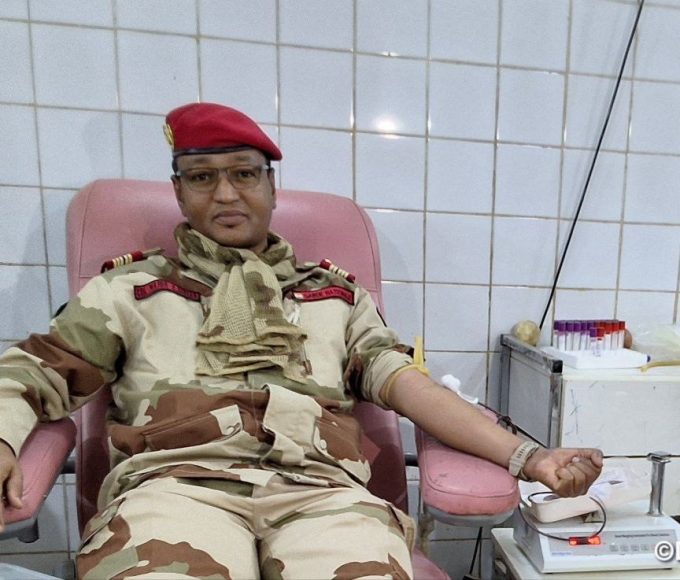
FG On Nurses Welfare: “Clip Their Wings, They Go Nowhere”

The past few weeks have been distressing for Nigerian nurses grappling with the potential realities of a new development in their profession.
In a recent memo, the Nursing and Midwifery Council of Nigeria (NMCN) introduced revised guidelines for individuals seeking certificate verification from foreign Nursing Boards/Councils. The Registrar, Dr Faruk Umar Abubakar, announced on Wednesday, 7th February 2024.
According to the new guidelines:
- Applicants must initiate verification applications through the NMCN portal and pay a non-refundable fee of N300,000
- Eligible applicants need at least two years post-qualification experience and hold an active practising license with at least six months of validity.
- A letter of Good Standing is required from the applicant’s place(s) of work and the last nursing training institution attended. The responses on these shall be addressed directly to the Registrar/CEO, Nursing and Midwifery Council of Nigeria, as the Council shall not accept such letter(s) through the applicant.
- Only Certificate(s) of Registration, not Notification of Registration, will be accepted.
- Verification applications typically take a minimum of six months to process, and incomplete documentation will not be accepted.
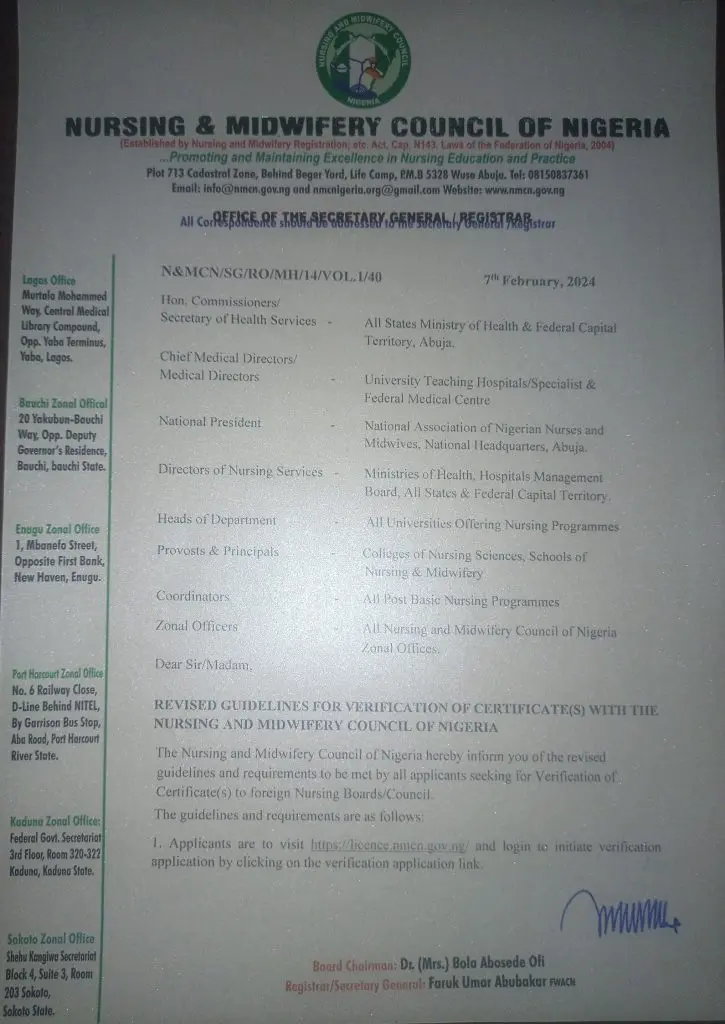
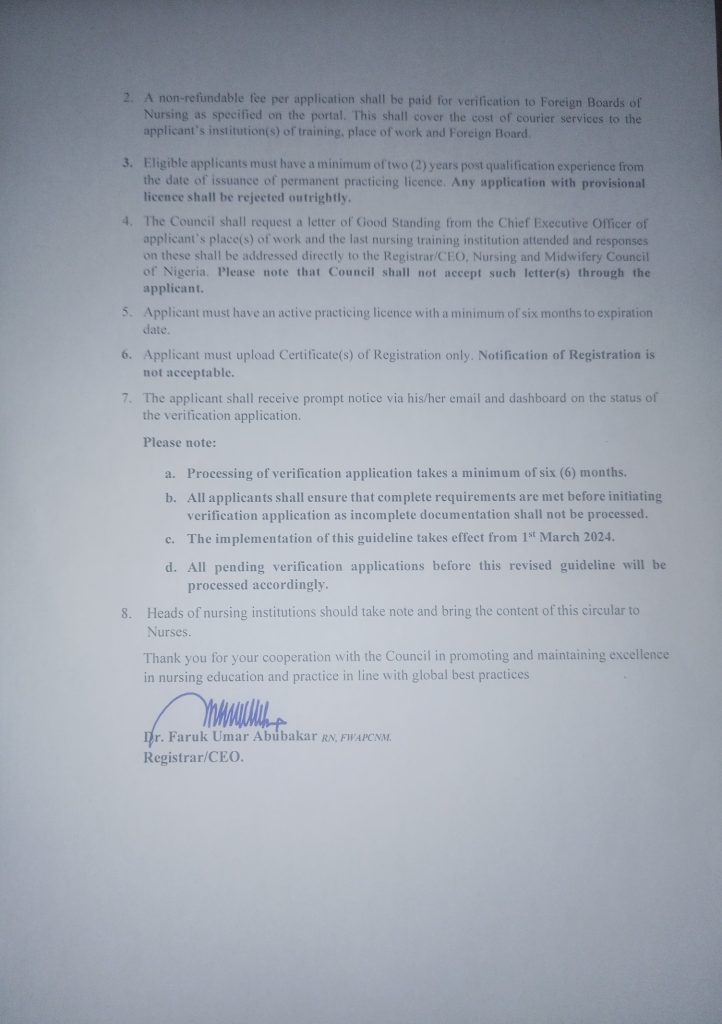
Nursing institutions’ heads were tasked with disseminating this information to nurses under their supervision, as the guidelines are slated to take effect from March 1, 2024.
The revised guidelines aim to streamline the verification process and ensure the authenticity of certifications held by nursing professionals. This is according to the Council- West Africa Weekly, however, finds that the consequences of this directive are far-reaching.
Implications of the New Guidelines
The new guidelines, issued by the Nursing and Midwifery Council of Nigeria (NMCN), have introduced stringent conditions for the verification of nursing certificates, particularly for nurses seeking to work overseas. The guidelines have been met with resistance from nurses who view them as oppressive and detrimental to their professional mobility and welfare.
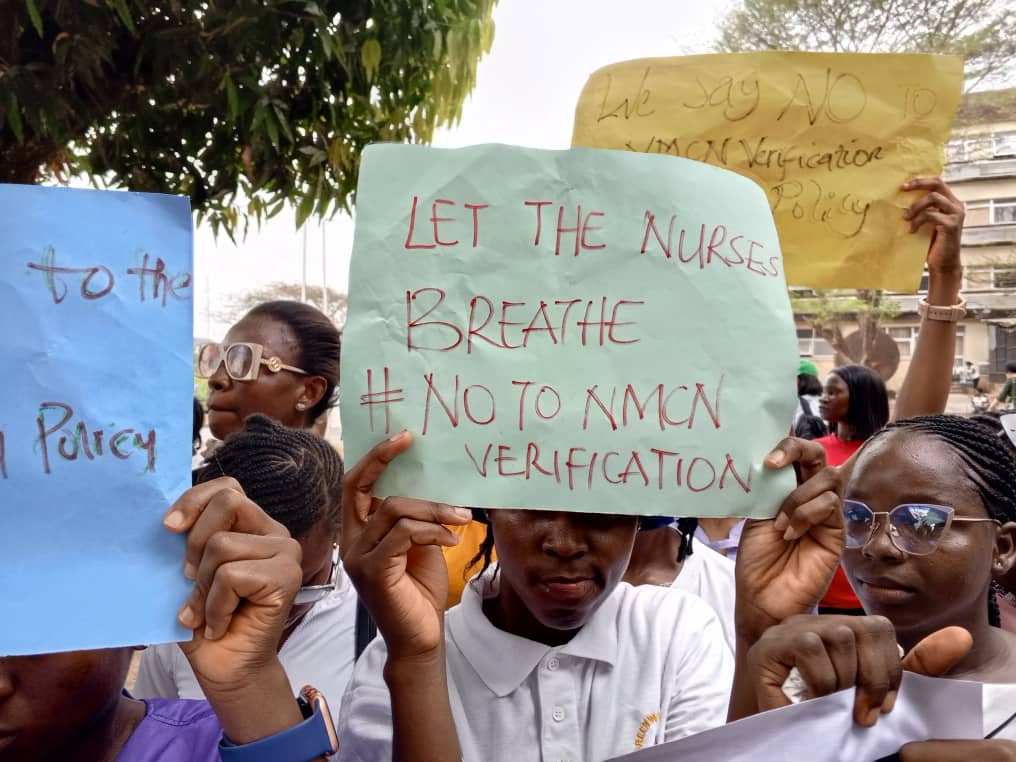
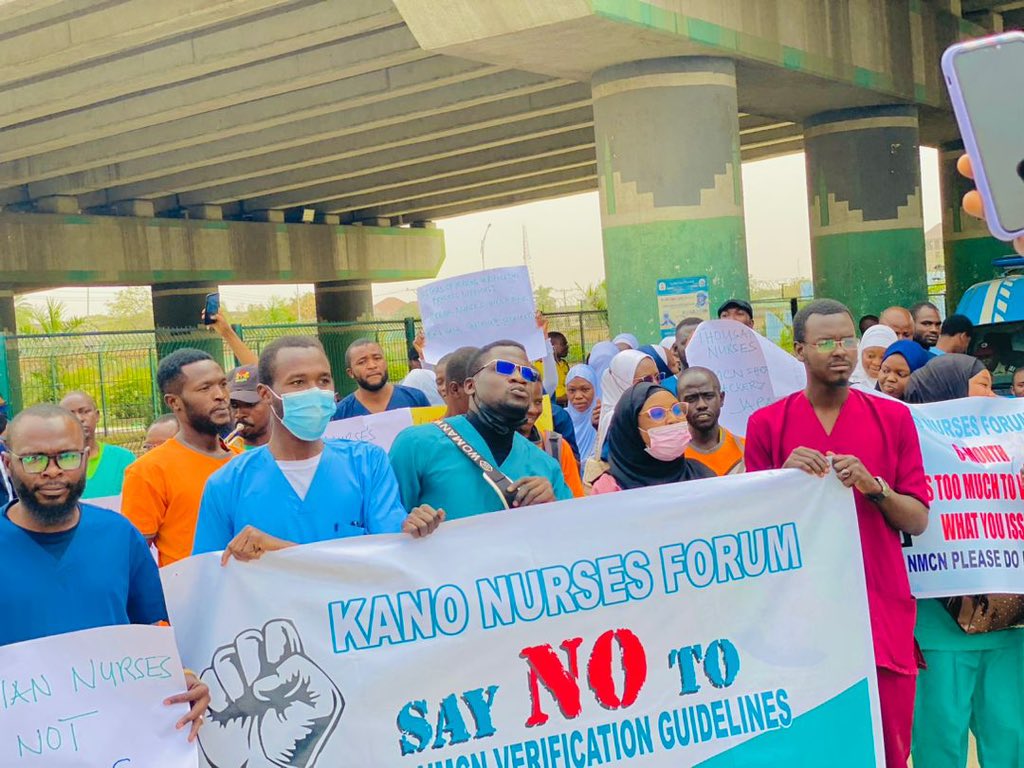
The revised guidelines have been criticized for potentially hindering the ability of nurses to pursue career opportunities abroad, as well as for imposing additional bureaucratic hurdles and delays.
Explaining the current wave of opposition from nurses nationwide over the newly updated guidelines to the understanding of those who might be lost of the potential implications of this move by the NMCN, an X-handler, elucidated that becoming a nurse in Nigeria requires two routes- either through a 5-year Nursing Degree from a University or a 3-year program at the School of Nursing. Both routes award one with a nursing practicing license after passing a Professional Qualifying Exam.
This Nursing License is what makes one recognized and employable as a Nurse by Private or Government Hospitals both locally and internationally, and it is issued by a government body which in this case is the Nursing and Midwifery Council Nigeria (NMCN) which controls and oversees the nursing profession.
He explained further that this nursing license expires every 3 years and can only be renewed through the NMCN. However, due to poor career growth, lack of job opportunities, and being underpaid, most nurses seek Job opportunities overseas, which, when lucky enough to find a potential employee, requires them to be verified by the council as part of the prerequisites to seal the employment. And the responsibility to confirm this status of qualification to the potential employer lies solely in the hands of the NMCN.
Trouble Brews for Nigerian Nurses
By imposing a mandatory two-year post-graduation work experience before applying for verification, the NMCN has mandated that no fresh Nursing graduate can apply for jobs overseas. Bearing in mind that from issuance to expiry date, the working license of a nurse has only a 3-year lifespan. This means that after the compulsory 2 years of work service, the license is left with only a year before it expires.
With only a year left to apply for verification, according to the NMCN guidelines, the verification process which used to take a minimum of two weeks will now take them a minimum of 6 months with the possibility of further delays. This time extension of the verification process has been perceived by nurses as a direct attempt to frustrate international employers into terminating employment offers and seeking workers elsewhere, with Nurses from all over the world seeking the same opportunities.
Furthermore, in a bid to close all gaps in ensuring that fresh nurses go nowhere, the NMCN as part of its requirements for the verification process demands that a letter of good conduct be sent from the nurse’s current Nigerian employer and Alma Mata – else they would not even be considered for verification even after the 2 years of compulsory service.
Nurses perceive this to be a delay tactic as most employers won’t want to let go of any hard-working, experienced personnel. This puts the nurse in a beggarly position giving their employer more lordship right over them, which they perceive overrides their autonomy and legal status as a profession. This would also promote bribery in the long run as employers would take it as a means to leech off desperate nurses in need of these letters.
Lastly, in a case where a nurse meets all these requirements, what happens when their license with a 3-year lifespan expires during the long wait to meet verification requirements?
The entire verification process gets canceled and they become stuck in a system that offers no room for career growth while they remain underpaid.
Thus, nurses have expressed their frustration by opposing and protesting widely against the new guidelines. Nursing associations in different parts of the country including Abuja, Lagos, Zaria, and Oyo, among others, have joined in and called for the reversal of the new requirements. The advocacy revolves around improved remuneration, better welfare, and a more supportive regulatory environment.
The NMCN’s defense is that 15,000 nurses left the country in 2023, which according to NMCN Registrar Faruk Abubakar, means that the the new guidelines are in the best interest of the country.
The Smarting Reality of Being a Nigerian Nurse
Do you beat a child and tell the child not to cry?
Nurses are a regular feature in hospitals and healthcare facilities – they almost wear their identity on their sleeves. In all communities, this set of health workers plays a vital role in offering expert care throughout the entire lifespan, from birth to the end of life.
Their responsibilities encompass direct patient care, case management, setting nursing practice standards, implementing quality assurance procedures, and overseeing intricate nursing care systems. In many cases, they do ‘the dirty jobs’ in health management.

Despite the indispensable and terrific roles they play in their sector, nurses have been plagued with peculiar challenges. This is especially true in the Nigerian healthcare landscape where nurses are grossly underpaid, undervalued but overstretched.
A recent poll conducted among 3,897 nurses showed that a large number (48%) of Nigerian nurses earn a measly salary of N25,000 – 50,000 (16- 33$). Only 4% who voted on the poll earn up to N200,000.
The poor remuneration is further exacerbated by Nigeria’s regressive economy and deteriorating security situation. There is no functional system or room for growth for these professionals. Also, although all healthcare workers face varying degrees of violence, studies show that nurses experience up to three times higher rates than others.
The all-round cost/implications of living in Nigeria have increasingly become a threat to the living, triggering the yearly mass relocation of nurses to climes that permit growth. Over 42,000 nurses left the country in the last three years. In 2023 alone, it was over 15,000.
Speaking about the emigration syndrome, the President of the National Association of Nigeria Nurses And Midwives, Michael Nnachi, said,
“As a result of poor wages and lack of decent work environments, over 75,000 nurses and midwives have emigrated from Nigeria within five years. Shortage of nurses and midwives, especially in certain areas of specialization and geographic regions, the increased rates of attrition and a chronic shortage of nursing personnel in the country increased workloads on nurses without an equivalent compensation, exposing them to more health hazards and compromising the quality of healthcare delivery.”
The mass exodus of nurses further weakens Nigeria’s wobbling healthcare sector. Instead of addressing nurses’ welfare, salary scale, shortage of staff, and other pertinent issues, however, the Nigerian government seems to have resorted to ruthless subjugation.
On April 6, 2023, a bill seeking to curb brain drain by mandating Nigerian medical doctors to practice for, at least, five years in the country before going abroad, passed for a second reading in the House of Representatives. In a similar move, the National Assembly called for imposition on the number of nurses leaving the country.
NMCN’s recent directive is, undoubtedly, another desperate ploy to address the brain drain. The Federal Medical Centre, Yenagoa chapter of the NANNM, said in a document addressed to the national headquarters by its Secretary, Donkori Menizibeya,
“The Nigerian government is aware that it lacks legal grounds to prohibit Nigerian nurses from migrating amid the country’s current hardship and poor health system. Thus, has strategically resorted to using our regulatory bodies to freeze the potential of Nigerian nurses.”
The NMCN is the sole legal, administrative, corporate, and statutory entity mandated by the Federal Government to guarantee the provision of safe and effective nursing and midwifery care to the public.
The Council’s new guidelines, in collaboration with the government’s efforts to stop brain drain, are not only oppressive but absurd.
Do you beat a child and tell the child how to react? It is said that if you pick up one end of the stick, you also pick up the other.
From A Nurse’s Mouth
West Africa Weekly spoke to Adegboyega Yusuf, a nurse based in Lagos, who raised concerns regarding government policies affecting the nursing profession and the dire state of nurses’ welfare in Nigeria.
He shed light on the challenges faced by nurses and their perspectives on the current situation.
“The welfare of nurses here in Nigeria is bad and low which is why we tend to seek greener pastures out of the shores of the country. Nurses here in Nigeria aren’t valued and treated poorly. Imagine after spending around 3-5 years to obtain the certificate and be paid 40k or 50k,” Adegboyega noted.
He expressed strong opposition to the government’s policy targeting just graduating nurses. According to him, such policies are unjustifiable and infringe upon the rights of nurses. The nurse firmly believes that the government does not have the authority to dictate such policies on nurses.
Regarding the welfare of nurses in Nigeria, he painted a grim picture, describing it as poor and inadequate. Nurses in Nigeria, according to him, are undervalued and treated poorly despite their crucial role in healthcare delivery.
When asked about the possibility of the government shifting ground in response to recent protests by nurses, he expressed skepticism.
Citing the government’s historical reluctance to address nurses’ grievances and the lack of responsiveness from relevant regulatory bodies, the nurse believes that the government is unlikely to change its stance. Addressing the issue of brain drain in the medical sector, he reframed it as “brain growth,” and emphasized the continuous influx of new nurses into the profession alongside the departure of experienced ones.
He attributed the exodus of nurses to poor working conditions and low remuneration, stressing that better pay would incentivize nurses to stay and contribute to the healthcare system.
“I don’t think there’s a brain drain in the medical sector, rather I’ll call it brain growth reasons being that Nurses and doctors are leaving, others are graduating from school. At least over 500 nurses graduate a year. What the federal government needs to do is pay us well, then people will be willing to stay. The government didn’t send me to school so they can’t stop me from leaving,” he concluded.
As long as the core issues are not addressed, the stifling verification structure will achieve little progress -or none at all, as a group of concerned nurses have sued the Nursing Council over its oppressive stringency.
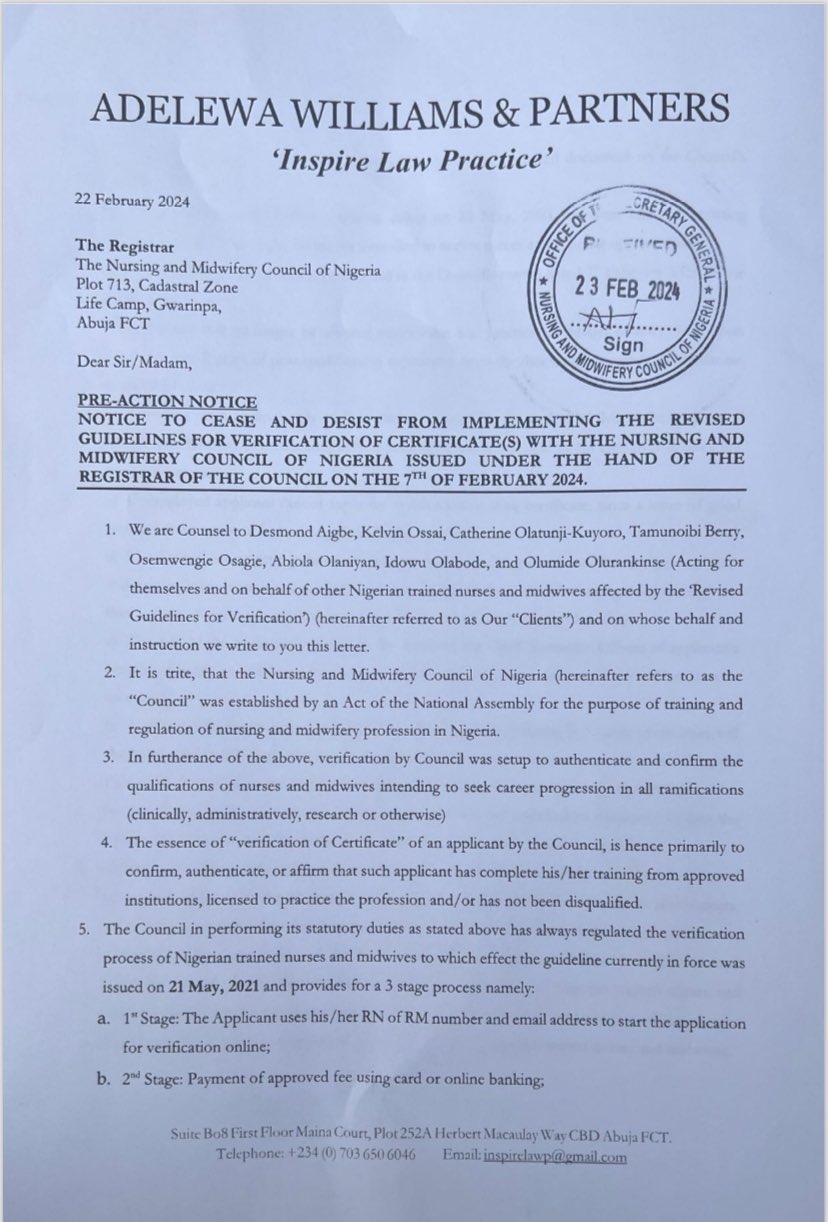
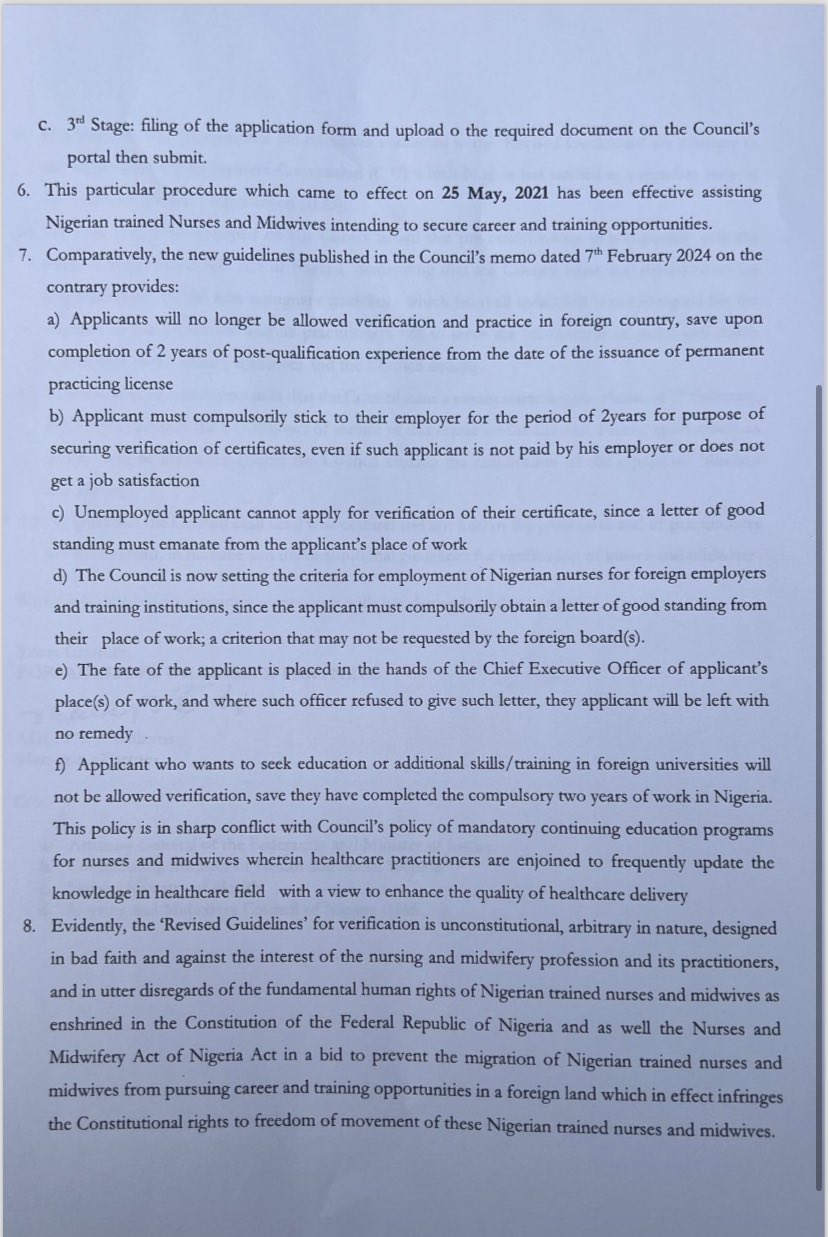
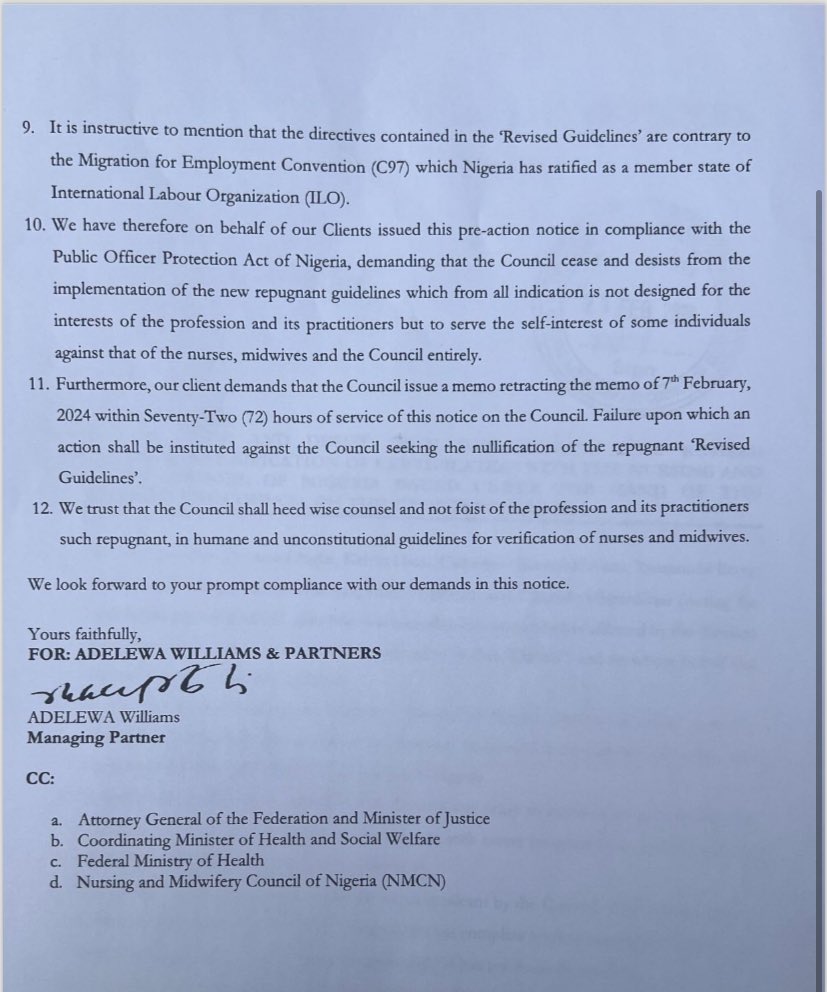
Read more: Terrorists destroy military armoured vehicles in Zamfara
About The Author
Related Articles
Ifunanya’s Death and the Price Nigerians Pay for a Broken Health Sector
The sudden death of fast-rising Nigerian singer Ifunanya following a snakebite in...
ByWest Africa WeeklyFebruary 2, 2026MLMs Like Neolife Face Rising Criticism in Nigeria Over Financial Losses, Psychological Stress, and ‘Brainwashing’ of Young People
Multi-level marketing (MLM) companies operating in Nigeria, including well-known names such as...
ByWest Africa WeeklyDecember 16, 2025Niger: National Guard Organizes Blood Donation Drive to Support Health Services
The National Guard of Niger (GNN) launched a major blood donation campaign...
ByWest Africa WeeklyNovember 13, 2025Mali: President Goïta Launches Landmark Hospital Development Programme
President Assimi Goïta has unveiled an ambitious national initiative to transform Mali’s...
ByWest Africa WeeklyNovember 12, 2025










